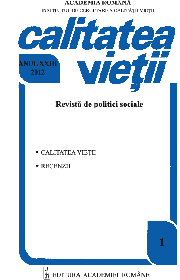
We kindly inform you that, as long as the subject affiliation of our 300.000+ articles is in progress, you might get unsufficient or no results on your third level or second level search. In this case, please broaden your search criteria.








BENJAMIN FONDANE, dans la revue «Non-Lieu», dirigée par Michel Carassou, Paris 1978. LES FONTAINES DE L'AME, poèmes, par Angela Ghelber, aux Editions l'Age d'Homme, Lausanne, 1977.
More...





Since its independence, the state of Moldavia has been oriented towards the family of European Union. But the European direction can be replaced by the pro-Eurasian direction, promoted by pro-Russian political forces in this country. In this respect, people options are divided. The sociological study entitled: “Vox Populi – The Republic of Moldova” during October 21–November 2, 2013 period, initiated and developed by the Association of Sociologists and Demographs from the Republic of Moldavia has researched both European and Eurasian options. The research sample included 1 192 respondents from 79 localities, without the Transnistria region, and it was representative for the adult population, with a maximum error of ± 2.8%. The authors of the study present the reasons of these options, quantitatively and qualitatively. Their conclusions are the following: the Moldavian population knows very little the risks and the benefits of the accession to the European Union. Its sources of information are the mass-media, first, the tv, but there are no special editions devoted to this association. From case to case, other sources are: the internet, the discussions with friends, close people. The population does not know about the infrastructure development projects, of training, of joint ventures with EU Member States, or about the grants which started in 2010, since the “Alliance for European Integration” coalition is in state. Group interests of the politicians, the judicial corruption and its involvement in press scandals have led to the collapse of power and have eclipsed the European path declared by the Governors. In these circumstances, taking advantage of the precarious social-economic situation, the Communist opposition, hostile to the idea of associating with the European Union, with the support of the Russian Federation, initiated terrorist actions, disinformation, mass manipulation of the population, for the accession of the Republic of Moldavia to the Customs Union Russia–Belarus–Kazakhstan, practically, for the reconstruction of the neo-liberal principles of Imperialist Russia. During the next EU Summit from Vilnius, the Government of the country will join all the efforts of civil society, NGOs in the Republic of Moldavia, to demonstrate that they have the ability to organize, convince and attract people in knowing the advantages and disadvantages of an association to the European Union. All this, in order to avoid the manipulation of the population and its disinformation, its use against the national interest by hostile political forces.
More...

Based on the concept of “good society” which was presented at the International Conference “Towards a better society. European Perspective”, the article aims to present a minimum consumption model, but also a view on the purchasing power of the minimum wage from EU’s countries in the Romanian economy. The paper highlights the importance of measuring realistic consumption pattern of poverty in a country or in a certain period of time, and of course, measures can be taken to mitigate the fall into poverty, to support vulnerable population groups and the cost estimates required for the satisfaction of urgent needs. The perspective that we want to present is that we can compare the most important and widely used types of wage income: the average and the minimum wage of the population, in different European countries, on the Romanian market, from this perspective, projecting the purchase of various food products and services with the income of the employees working in the European community. This comparative picture is more suggestive, as the whole world, including the European Union, was affected, for several years, by economic and financial difficulties, and which affected also countries where people's lives are equal to the welfare concept.
More...



In the first decade after the fall of the communist regime in 1989, Romania was one of the major sending countries for inter-country adoptions, As a result of external pressures, after 2001, domestic adoptions became prevalent, and since 2004, no international adoption took place. In recent years, studies on domestic adoptions flourished, but none investigated how adoptive families disclose to the child that he/she is adopted. In 2012, a new legislation on adoption required adoptive families to disclose to the child that is adopted, this topic being also included in the curriculum preparing families for adoption. The present study investigated adoption disclosure practices of Romanian adoptive families in a nationally representative sample of domestic adoptions carried out between 2000–2009 (N= 516). The research was carried out with the support of the National Office for Adoptions, local Departments for Social Work and Child Protection and UNICEF. While a great majority of families (95%) agree with adoption disclosure, only 69% disclosed. One in ten families looked for support to disclose. The mean age of the children at disclosure was 5 years, families from rural areas being more open than those from urban areas (73% vs. 67%). A very small proportion of children are in contact with the biological family, and mostly with their brothers and sisters than with the parents. More than two thirds (69%) of the families who experienced reunification with the biological family (10% of total sample) had a positive experience. Adoptive families do not tend to agree with open adoptions. Post-adoption social services need to be further developed to support families and children on disclosure strategies and/or reunification, if wanted. Requiring adoptive families to disclose to the child seems to remain a controversial issue in Romania, and open adoption is not too popular, but positive examples can be used.
More...